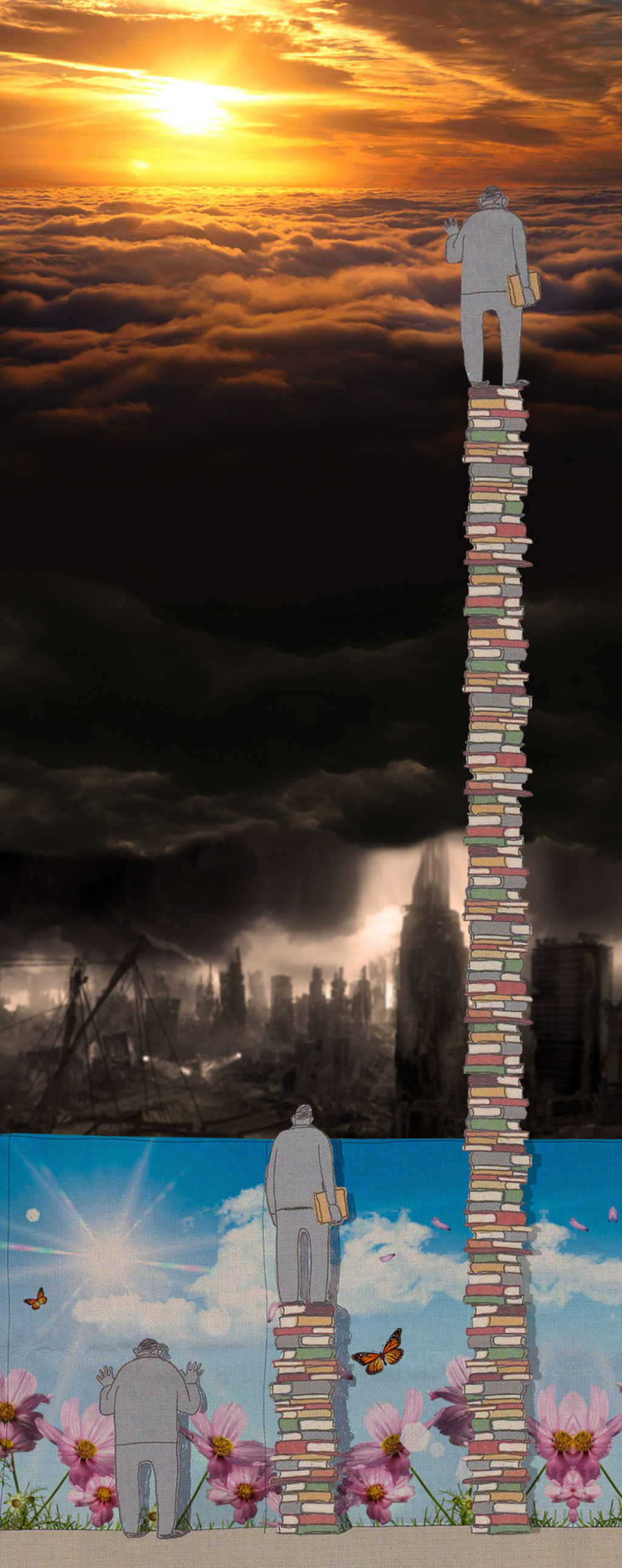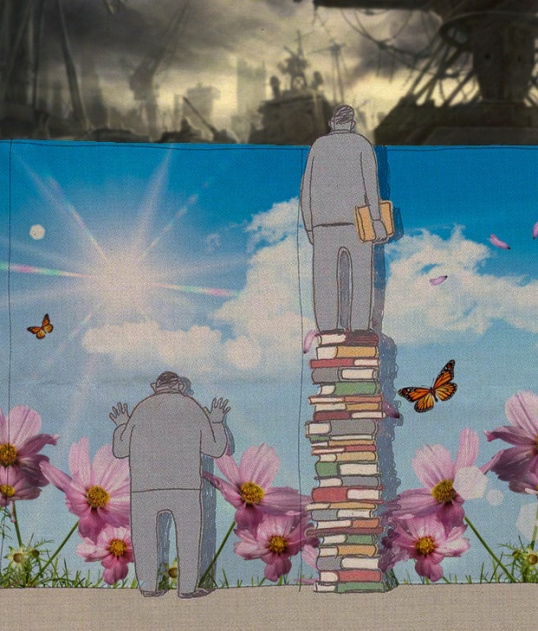On a random day, about two years ago, I was scrolling through the vast wasteland of social media and I stumbled up this image:

I am not sure why, but I immediately felt - let's say, mildly annoyed. It came across as obnoxious. And as it turns out, it is a twist on the original below...

I have no way of knowing for sure which image came first, but that is not the point. What both images seem to be saying is this: The more you read books, the more you realize how bad things really are - BUT, if you read a LOT of books, then you will see brilliance and wisdom (and hope?) beyond that.
This got my wheels turning. This really stuck with me and for some reason I have come back to this image several times. Three insights came to mind since the first time I saw this, so I wanted to share them here.
Knowledge does not equate to wisdom.
True wisdom can only be gained through experience, and perhaps some reflection. In fact, one would hard pressed to define the word "wisdom" (Spoiler Alert: Online dictionaries do not do this word any service). How many of us know a very intelligent, well read, highly educated person who holds ludicrous beliefs?
One could argue that the average Liberal Arts and Social "Science" professor is devoid of wisdom almost by definition. This is because Wisdom implies a certain degree of critical thinking. Anyone able to think critically at even a basic level would be able to observe that there is nothing scientific about sociology or the social studies. According to some Anthropology 101 and Sociology 101 textbooks (Yes, I have read and skimmed through a few), humans, tribes, and cultures do not conform to neatly defined boxes and conventions. So if we cannot classify humans in any way that would be considered "scientific" in terms of classification, in part because to do so would equate to stereotyping, then we can simply not call it science. One could debate this all day long, but that does not change the fact the the social sciences have hobbled themselves by this conundrum - to put cultures and peoples into categories and boxes is akin to enabling racism (according to them, not me), yet failing to do so mitigates any value they offer in terms of deeper understanding of the ways in which cultures differ and correspond.
Much like any well-read social scientist, or engineer, or doctor, or academic of any sort, every moment spent reading a book is a moment of experience lost. It is an unfortunate tradeoff, but a tradeoff nonetheless. And such is one of life's great paradoxes - the ignorant run about enjoying the fruits of life, flailing, clawing, and stumbling in search of the visceral. Only some will come to understand their context, and the greater context in which we all live. But at least they lived! Likewise, the learned spend their lives buries in books, searching for knowledge; and many do indeed find that. However, what is knowledge without experience? At this point the reader should call me out for pointing out the two polar ends of this, but that is also part of the point. It is the great mass of people in the middle that experience more or less of both. One might imagine it looking like a standard normal distribution curve - with the outliers being the self-righteous nerdy virgins locked in a room buried in books on one end, and hedonistic degenerates on the other.
It is clear to me from the image which is implied to be which.
Either way, it is a cute concept, albeit inspiring and perhaps well executed; however deeply flawed.
Inaction is the problem
Whatever might have been intended, this image paints itself into a corner; one can only achieve (enlightenment?) by reading more and more. Yet it fails to acknowledge the passivity of all three actors. The ignorant man staring at the wall, foolishly believing what he sees before him (news, social media, etc,) is looked down on by the two seemingly intelligent actors. But they are standing on the same street, on the same block, doing the same thing - nothing.
My youngest son saw this image when I first started jotting notes about it, and asked me what it meant. I asked him "Well, what do YOU think it means?" He said "When you get smarter you see more things?" I nodded my head in pride and said "Well said, son." (And no, I did not launch into a rant about the meaning of life, depicted through cartoon memes. That's what this blog is for!)
Then he asked me an odd question (he is THAT kid): "Dad, which one are you?" No joke, hand on my heart, my kid asked me that. My first thought was, dang - he thinks I could be any one of them! I replied: "I am none of those guys. If you zoom waaaaayy in there, you will see a small spot of green. About the size of a car's shadow on the ground. I am there sweeping and cleaning. I have not read as many books as the really high up guy, and I know too much to believe that life is all rosy like the guy on the left. And the guy in the middle is just staring at that mess and doing nothing about. So a long time ago I climbed over that wall and got busy cleaning up. No one told me where to start, and no one even asked me to do it. Maybe when you get older, you can hop over that fence and help me do some cleaning.
He smiled and then asked "When is dinner - can we have pizza?" Followed by a big grin. It worked - I ordered pizza right there. But a part of me hopes that my message sunk in.
And upon thinking about that moment, it occurred to me that I run the risk of coming across as more arrogant than any of those characters. That somehow my taking action is morally superior to learning. I also run the risk of exhibiting that working class defensiveness thing - "who cares about college, those guys probably don't even know how to tie their shoelaces" Neither of these was intended. In fact, in my head anyway, my sense was that perhaps we need all four types of man - and a few other types. After all, who writes the books? Who built that fence, who designed those factories; and who caused that destruction? My obvious choice was to hop off that hamster wheel and figuratively (and often literally) pick up a broom and get busy doing something useful instead of bloviating about it (this article notwithstanding!)
 Tip deeplydisturbed for their post.
Tip deeplydisturbed for their post.
A slightly different perspective for you to consider:
I'm not sure who coined that phrase, but it is an important concept. Just as you stated above, "what is knowledge without experience?" Many people absorb knowledge but do not learn anything (or have no appreciation for the things lesser than themselves).
Review the picture again and pay attention to the man (men) in the image. The first is all about experience (chasing butterflies and living in the moment) but "ignorant". Whereas the second man is edumacated but only sees the bad in the world (as you described). Finally, the third man has the same pose and expression on the left side (hand gesture, posture, and even the damaged trouser leg) as the first man on the left. Moreover, he has the book in his right hand like the man in the center. The short and sweet version of a long diatribe is that the man on the right is a combination, culmination, hybrid of the other two. The full human experience and knowledge is required to be fully enlightened. The man on the right standing on the huge stack of books is knowledgeable but also still able to see the beauty in the world.
Analogies hold different meaning to different people. What I gather from the picture is that the more knowledge you gain, the closer you get to wisdom. I choose to see the books depicted here as just an allegory to knowledge. I don't think the picture is an endorsement to be a shut-in neet who only loves reading books.
Knowledge comes in various forms. Sometimes, you gain it via reading the experience of others. Sometimes, you gain it via your own experience. The best way to achieve is to get guidance from those who are already experienced, experiment on their guideline, to determine what works for you and to determine how to get what you want as opposed to achieve what your mentor did. While this is the best way to achieve anything, not everyone can afford this. Not everyone can afford to get guidance from mentors, not everyone can get mentors, not everyone afford the time to experiment, not everyone can afford the time and resources to find your own path. We are all limited by our resources, options, time and effort at any given time.
In terms of TRP, I would like to project this picture as the difference between a bluepill guy, a blackpill guy and a redpill guy. When you don't know anything, women are wonderful. When you know something, women are dangerous and untrustworthy. When you know women, women are just women. You stop pedestalizing them, whether it is in a positive way or in a negative way. They stop being special and just become people.
I've run the gamut of what is being described here. I've been clever, smart, delusional, wary and also wise. Sometimes, you just cycle through these stages. Sometimes you progress and sometimes you regress. Just because you reach the top does not mean you are the best. You've just reached a new level and have to start building from the bottom there.